This article is an orphan, as no other articles link to it . Please introduce links to this page from related articles ; try the Find link tool for suggestions. (February 2024) |
Mabel Billah Greenberg (1889-1933) was a British artist.
This article is an orphan, as no other articles link to it . Please introduce links to this page from related articles ; try the Find link tool for suggestions. (February 2024) |
Mabel Billah Greenberg (1889-1933) was a British artist.
She was born in Birmingham and was well known in Birmingham and in London. She was the daughter of Israel and Miriam Greenberg of Edgbaston, Birmingham. Israel Greenberg was a jeweller, trading as I.S. Greenberg & Co in Birmingham's Jewellery Quarter. [1]
Greenberg studied at Birmingham Municipal School of Art and the Slade School of Art. Two of her works were shown in Slade student exhibitions: Study of a Young Man won first prize for Head Drawing in 1918 [2] , and Male Figure Standing won the Second Prize for Figure Painting in 1919 and remains in the UCL Art Museum. [3]
Three of Greenberg's paintings are in UK collections:
Other works reported in national and regional press as shown at various exhibitions include:
Press references mention a second portrait [16] of Helene (Helen) Hedin, and with a photograph of Greenberg at work, to a portrait of the actor John Stuart. [17]
Mabel Greenberg died in London on 30 September 1933 and was buried at Witton Jewish Cemetery in Birmingham.

Selwyn Image was a British artist, designer, writer and poet associated with the Arts and Crafts Movement. He designed stained-glass windows, furniture, embroidery, and was an illustrator of books. Image was the seventh Slade Professor of Fine Art at Oxford from 1910 to 1916.
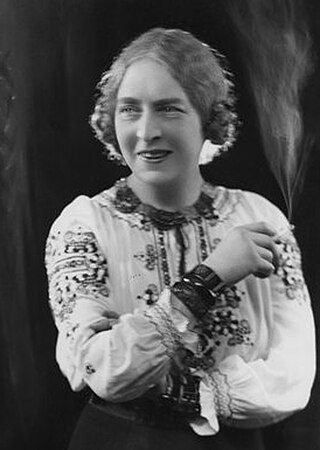
Dame Laura Knight was an English artist who worked in oils, watercolours, etching, engraving and drypoint. Knight was a painter in the figurative, realist tradition, who embraced English Impressionism. In her long career, Knight was among the most successful and popular painters in Britain. Her success in the male-dominated British art establishment paved the way for greater status and recognition for women artists.

Anna Airy was an English oil painter, pastel artist and etcher. She was one of the first women officially commissioned as a war artist and was recognised as one of the leading women artists of her generation.

Dame Ethel Walker was a Scottish painter of portraits, flower-pieces, sea-pieces and decorative compositions. From 1936, Walker was a member of The London Group. Her work displays the influence of Impressionism, Puvis de Chavannes, Gauguin and Asian art. Walker achieved considerable success throughout her career, becoming the first female member elected to the New English Art Club in 1900. Walker's works were exhibited widely during her lifetime, at the Royal Academy, the Royal Society of Arts and at the Lefevre Gallery. She represented Britain at the Venice Biennale four times, in 1922, 1924, 1928 and 1930. Although Walker proclaimed that 'there is no such thing as a woman artist. There are only two kinds of artist — bad and good', she was elected Honorary President of the Women's International Art Club in 1932. Soon after her death, she was the subject of a major retrospective at the Tate in 1951 alongside Gwen John and Frances Hodgkins. Walker is now acknowledged as a lesbian artist, a fact which critics have noted is boldly apparent in her preference for women sitters and female nudes. It has been suggested that Walker was one of the earliest lesbian artists to explore her sexuality openly in her works. While Walker was contemporarily regarded as one of the foremost British women artists, her influence diminished after her death, perhaps due in part to her celebration of female sexuality. Made a Dame Commander of the Order of the British Empire in 1943, Walker was one of only four women artists to receive the honour as of 2010.
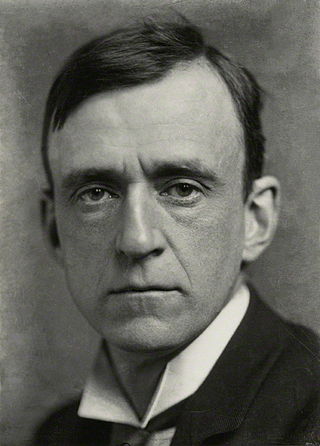
Henry Tonks, FRCS was a British surgeon and later draughtsman and painter of figure subjects, chiefly interiors, and a caricaturist. He became an influential art teacher.
Edward Brian O'Rorke was a New-Zealand-born British architect and interior designer.
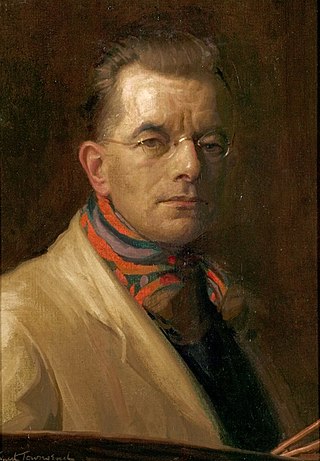
Ernest Townsend was a British portraitist from Derby.

Gilbert Spencer was a British painter of landscapes, portraits, figure compositions and mural decorations. He worked in oils and watercolour. He was the younger brother of the painter Stanley Spencer.
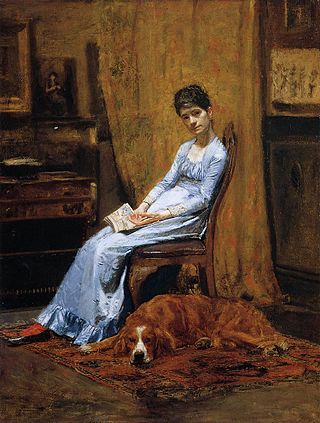
Susan Hannah Eakins was an American painter and photographer. Her works were first shown at the Pennsylvania Academy of the Fine Arts, where she was a student. She won the Mary Smith Prize there in 1879 and the Charles Toppan prize in 1882.

Winifred Margaret Knights was a British painter. Amongst her most notable works are The Marriage at Cana produced for the British School at Rome, which is now in the Museum of New Zealand Te Papa Tongarewa and her winning Rome Scholarship entry The Deluge, which is now held by Tate Britain. Knights' style was much influenced by the Italian Quattrocento and she was one of several British artists who participated in a revival of religious imagery in the 1920s, while retaining some elements of a modernist style.
Dryden Goodwin based in London, is a British artist known for his intricate drawings, often in combination with photography and live action video; he creates films, gallery installations, projects in public space, etchings, works on-line and soundtracks.

The Society of Women Artists (SWA) is a British art body dedicated to celebrating and promoting fine art created by women. It was founded as the Society of Female Artists (SFA) in 1855, offering women artists the opportunity to exhibit and sell their works. Annual exhibitions have been held in London since 1857, with some wartime interruptions.

Carl Randall is a British figurative painter, whose work is based on images of modern Japan and London.

Chila Kumari Singh Burman is a British artist, celebrated for her radical feminist practice, which examines representation, gender and cultural identity. She works across a wide range of mediums including printmaking, drawing, painting, installation and film.

Marion Boyd Allen was an American painter, known for her portraits and landscapes.
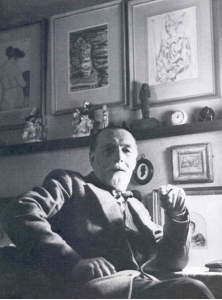
Clifford Hall, ROI, NS, was a British painter of street scenes and bohemian life. One of his more recognizable post-war phases was that of people covered to various degrees by a towel or blanket. Some have their faces turned from the viewer or hidden.
Leonard William Joseph McComb was a Scottish artist. He described his work as visual abstractions after nature. He was very interested in the detail in nature and declared that everything he drew or painted, whether a portrait head, flower, landscape, still life, or breaking sea wave, was, for him, a portrait.

Evan Charlton (1904–1984) was a British artist who painted surrealist landscapes and interiors.
Robin Craig Guthrie, was a British artist. He painted portraits, landscapes and murals and was also a draughtsman and book illustrator.
Alexander Christie (1901-1946) was a Scottish artist who specialised in portraiture, working mainly in oil or charcoal, occasionally in pastel. He was a regular exhibitor at the Royal Academy and the Royal Scottish Academy.